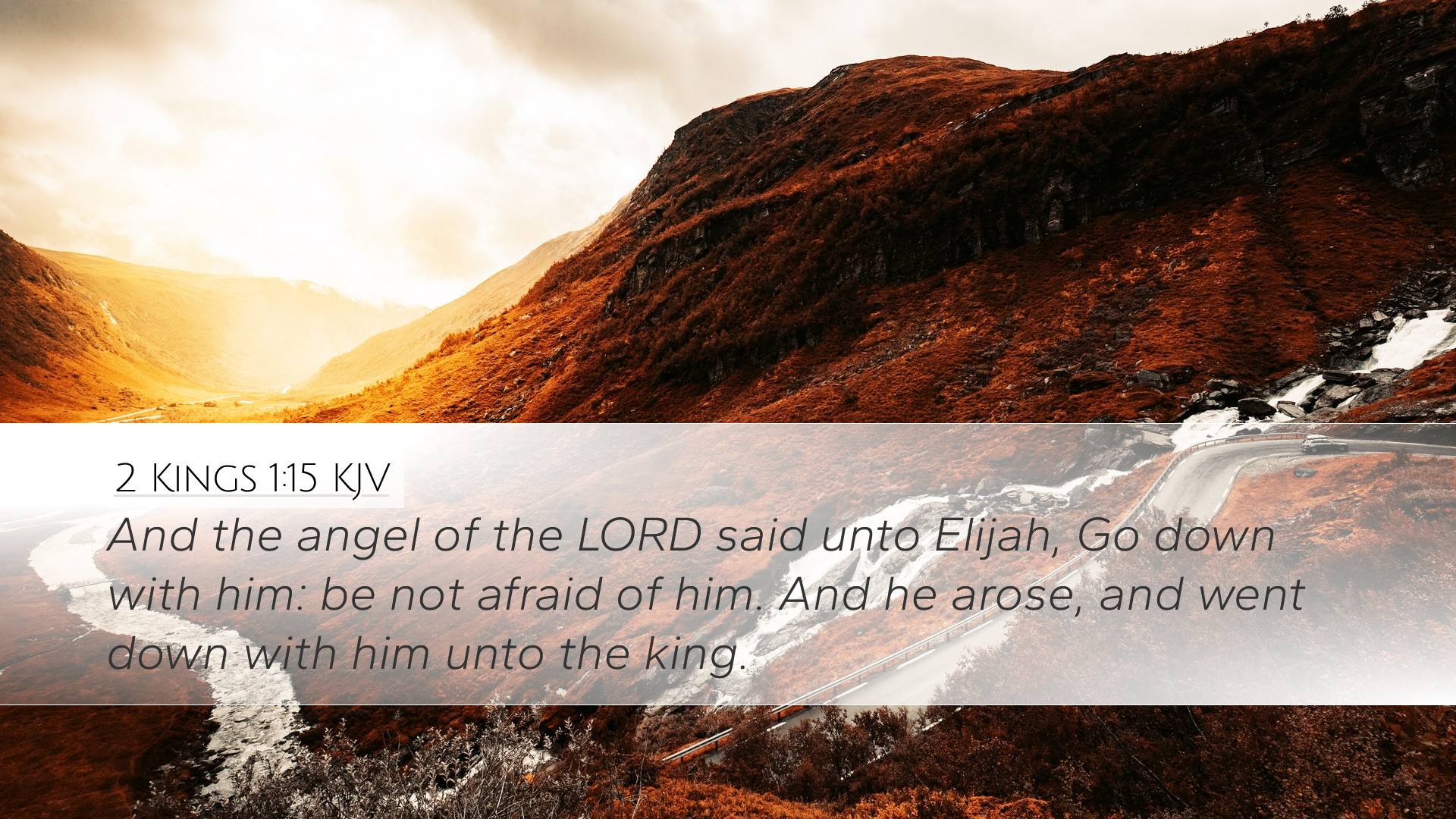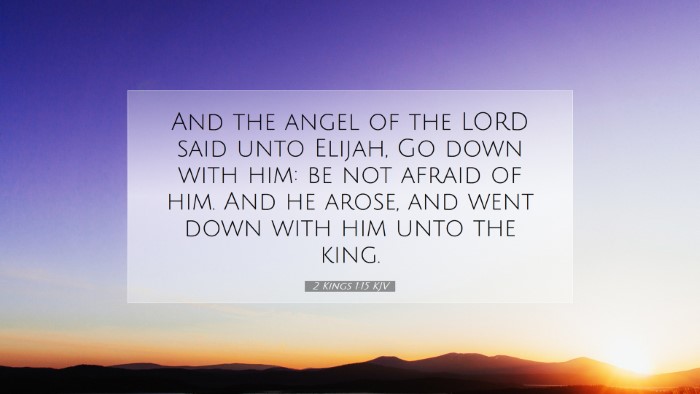Old Testament
Genesis Exodus Leviticus Numbers Deuteronomy Joshua Judges Ruth 1 Samuel 2 Samuel 1 Kings 2 Kings 1 Chronicles 2 Chronicles Ezra Nehemiah Esther Job Psalms Proverbs Ecclesiastes Song of Solomon Isaiah Jeremiah Lamentations Ezekiel Daniel Hosea Joel Amos Obadiah Jonah Micah Nahum Habakkuk Zephaniah Haggai Zechariah Malachi2 Kings 1:15
2 Kings 1:15 KJV
And the angel of the LORD said unto Elijah, Go down with him: be not afraid of him. And he arose, and went down with him unto the king.
2 Kings 1:15 Bible Commentary
Commentary on 2 Kings 1:15
Verse: 2 Kings 1:15 - "And the angel of the Lord said unto Elijah, Go down with him: be not afraid of him. And he arose, and went down with him unto the king."
Introduction
This verse encapsulates a pivotal moment in the life of the prophet Elijah amidst his confrontations with King Ahaziah. The interaction highlights divine direction and courage in the face of fear. The insights provided by various public domain commentaries reveal profound theological implications and practical lessons for believers today.
Historical Context
Understanding the historical backdrop is crucial. King Ahaziah of Israel, during a time of idolatry and rebellion against God, sends messengers to inquire of Baal-Zebub, the god of Ekron, concerning his health. God's response through Elijah embodies both judgment and mercy, demonstrating His sovereignty over Israel and the futility of seeking guidance from false gods.
Verse Analysis
Divine Instruction
Matthew Henry emphasizes that the command of the angel is a direct expression of God's authority. The phrase "be not afraid of him" signifies the Lord's reassurance, reflecting God's omnipotence even in the face of earthly authority. Elijah is admonished to look beyond the immediate threat posed by Ahaziah and to rely on God's protection.
The Role of the Prophet
Albert Barnes notes the prophetic responsibility of Elijah as he engages with the king. His obedience to the angel's command signifies the importance of fidelity to divine messages, even when facing hostility. Elijah's willingness to descend to the king serves as a model for believers: to confront sin and idolatry with boldness.
Human Reaction to Divine Mandate
Adam Clarke explores the psychological aspect of Elijah's experience. Prophets often faced fear and intimidation, yet Clarke highlights that true faith involves overcoming such emotions through reliance on God. Elijah's actions after the angel's message demonstrate an exemplary response—he chooses obedience over retreat.
Theological Implications
This verse provides rich theological insights:
- God's Sovereignty: The incident reinforces that God's plans prevail regardless of human rebellion. Ahaziah's idolatry does not thwart divine purpose.
- Divine Communication: The angel's message underlines how God communicates with His servants, guiding them through trials and challenges.
- The Nature of True Courage: True courage does not stem from the absence of fear but from obedience to God's call despite trepidation.
Practical Applications
The narrative surrounding 2 Kings 1:15 serves as a paradigm for modern believers:
- Trusting God in Adversity: Like Elijah, believers are called to trust God's direction, especially when faced with fear and opposition. This resonates with the New Testament call to fear not (Luke 1:30).
- Being Bold for Christ: Elijah’s example encourages the church to serve boldly in a culture that often promotes idolatry and sin.
- Obedience to Heavenly Calling: The account challenges believers to respond actively to God’s call, affirming the importance of faith in action.
Conclusion
2 Kings 1:15 serves as a rich source of spiritual nourishment and insight for pastors, students, theologians, and scholars. The verse illustrates the profound interplay of divine authority and human response, underscoring themes of courage, obedience, and the divine versus the human. Through the lens of this commentary, the life of Elijah emerges not merely as a historical narrative but as a vital encouragement for all who aspire to faithfully follow God amidst challenges.


